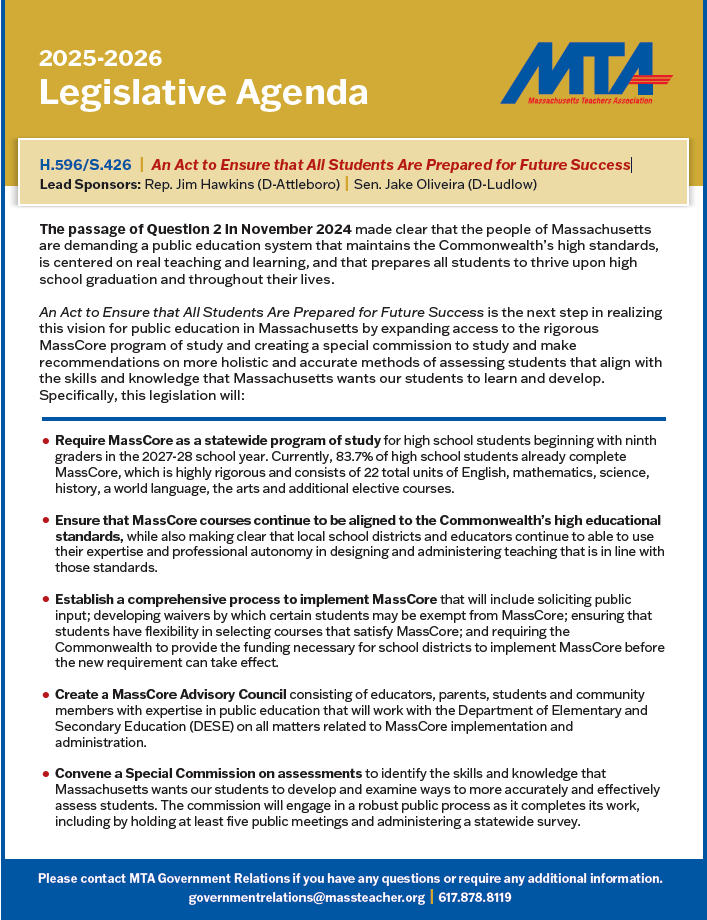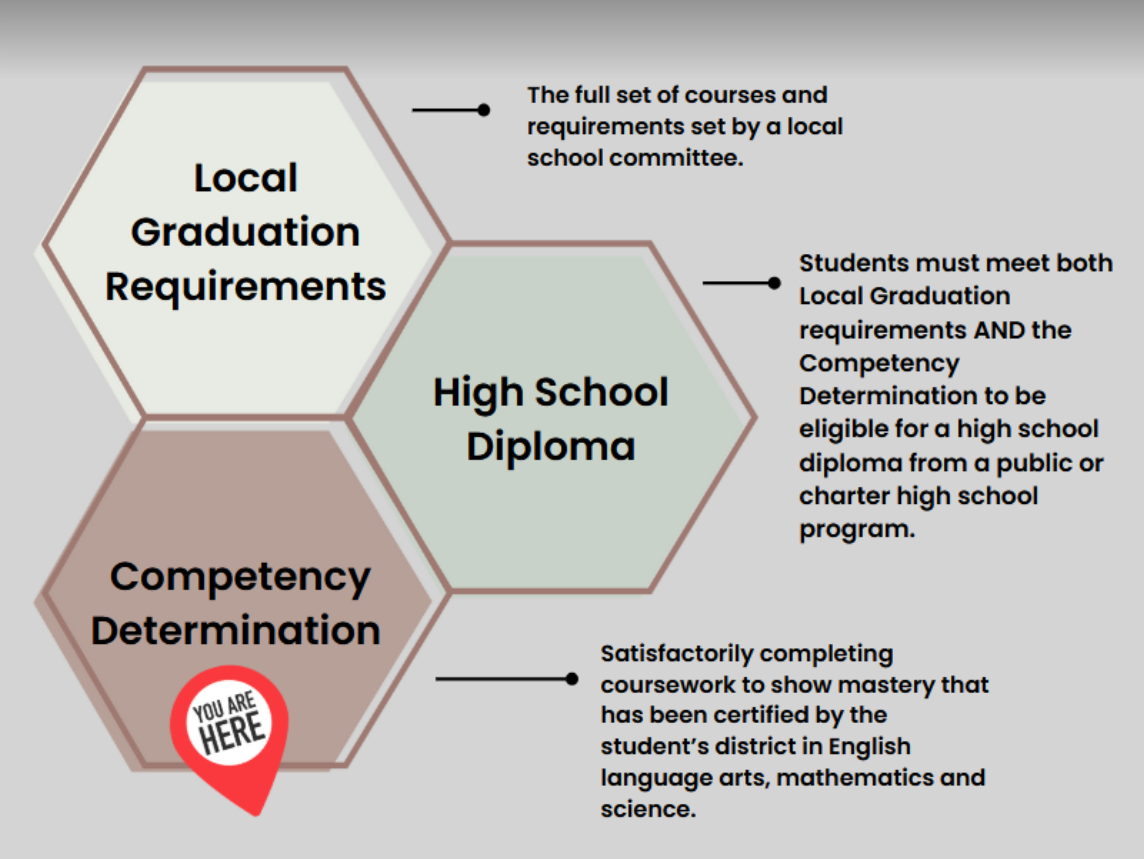
Reports say new grad requirements need work
Report outlines alternative to high-stakes testing
Recommendations follow 2024 decision by Mass. voters to end MCAS grad requirement
When voters eliminated the use of standardized MCAS exams as a statewide graduation requirement, Massachusetts was handed an opportunity to dramatically improve public education in the state by expanding learning opportunities.
In response, the Massachusetts Teachers Association’s Center for Education Policy and Practice and the national FairTest Center for Fair and Open Testing prepared a report outlining alternatives to high-stakes, standardized tests that measure student readiness for graduation in the 21st century. Whereas educators criticized the use of MCAS exams as a graduation requirement for shrinking what is taught, various other methods for assessing academic proficiency encourage a broader approach to teaching and learning.
The MTA and Massachusetts Association of School Committees sent the report to state Education Secretary Patrick Tutwiler and Commissioner of Elementary and Secondary Education Pedro Martinez, who together chair a council of stakeholders considering new statewide requirements for a high school diploma.
New grad requirements need to reflect public input
The 'People’s Proposal' cites six main principles to anchor new graduation requirements:
- Engage in a thoughtful planning process that first establishes a clear vision of what we want our students to know and be able to do by graduation. Unfortunately, the process thus far seems to have been speeding up, rather than slowing down to be inclusive, and has not been reflecting what was heard in the listening sessions.
- State support for local reform, guided by educators in dialogue with community members.
- Do not impose unfunded mandates on school districts. Adequate and equitable funding is essential to achieve the goals we all share.
- There need to be multiple pathways to a single diploma.
- New graduation requirements must center a commitment to deeper learning, thus preparing our students for the critical skills they will need when they graduate.
- Do not handcuff educators with onerous requirements, scripted curriculum and standardized tests that undermine their professionalism.
moving forward thoughtfully is more important than moving forward quickly
Public education advocates who held People’s Forums around the state to hear what education stakeholders had to say about the creation of new high-school graduation requirements found overlapping sentiment wherever they went, a main message being: moving forward thoughtfully based on broad public input is more important than moving forward quickly.
Since April, Citizens for Public Schools, with help from diverse community groups, local educator unions, and the MTA have been organizing community forums across the state, asking residents to discuss their views on what students need to know and be able to do when they graduate from high school. Those sessions yielded “A People’s Proposal to Prepare Our High School Graduates for the Future."
End of the MCAS graduation requirement
With passage of Question 2, educators look to more authentic evaluations

This story appeared in the Winter 2025 edition of MTA Today.
On Nov. 6, Danielle Seltzer’s first-period English class at Amherst-Pelham Regional High School was buzzing about the results of the presidential election.
One student finally asked, "Hey, what happened with the MCAS thing?"
"I said it passed, MCAS is no longer a graduation requirement," Seltzer recalled recently. "They all cheered."
That particular class, Seltzer noted, was for students with special education plans. She said the students are all capable of passing grade-level work, but doing so requires extra effort.
"One young woman — a ninth-grade student — said, ‘I’m so glad I don’t have to worry about MCAS anymore because I can actually focus on school,’ " Seltzer said. "What I didn’t fully realize until that moment, was that at age 14 because of the MCAS and because of who these students were, they already came into high school thinking that they didn’t have a chance. I am so inspired and reinvigorated by the fact that they now have that chance."
Voters decisively passed Question 2 in November, ending the use of the 10th grade MCAS exams as a state-mandated high school graduation requirement. Supporters of the ballot initiative driven by MTA members successfully argued that the high stakes of the MCAS exam narrowed learning and unfairly penalized students who just don’t perform well on standardized tests. In passing Question 2, Massachusetts joined the vast majority of states that have abandoned standardized tests as high school graduation requirements. Just six states continue to use standardized tests for graduation requirements, down from 27 states in 2012.
Legislation
An Act to Ensure that All Students Are Prepared for Future Success
The passage of Question 2 in November 2024 made clear that the people of Massachusetts are demanding a public education system that maintains the Commonwealth’s high standards, is centered on real teaching and learning, and that prepares all students to thrive upon high school graduation and throughout their lives.
An Act to Ensure that All Students Are Prepared for Future Success is the next step in realizing this vision for public education in Massachuse s by expanding access to the rigorous MassCore program of study and creating a special commission to study and make recommendations on more holistic and accurate methods of assessing students that align with the skills and knowledge that Massachusetts wants our students to learn and develop. Specifically, this legislation will:.
- Require MassCore as a statewide program of study for high school students beginning with ninth graders in the 2027-28 school year. Currently, 83.7% of high school students already complete MassCore, which is highly rigorous and consists of 22 total units of English, mathematics, science, history, a world language, the arts and additional elective courses.
- Ensure that MassCore courses continue to be aligned to the Commonwealth’s high educational standards, while also making clear that local school districts and educators continue to able to use their expertise and professional autonomy in designing and administering teaching that is in line with those standards.
- Establish a comprehensive process to implement MassCore that will include soliciting public input; developing waivers by which certain students may be exempt from MassCore; ensuring that students have flexibility in selecting courses that satisfy MassCore; and requiring the Commonwealth to provide the funding necessary for school districts to implement MassCore before the new requirement can take effect.
- Create a MassCore Advisory Council consisting of educators, parents, students and community members with expertise in public education that will work with the Department of Elementary and Secondary Education on all matters related to MassCore implementation and administration.
- Convene a Special Commission on assessments to identify the skills and knowledge that Massachusetts wants our students to develop and examine ways to more accurately and effectively assess students. The commission will engage in a robust public process as it completes its work, including by holding at least five public meetings and administering a statewide survey.
Additional Resources
DESE is considering regulations related to competency determinations for a high school diploma
Q. What is the competency determination?
A. The competency determination is simply a standard for a student’s competency in certain subject areas. Districts can and do have specific coursework, credits and attendance requirements as part of local graduation requirements. The competency determination is no longer tied to a single-point-in-time standardized test. Rather, districts will certify students have met competency in the same high standards based on completion of coursework that meets the same standards.
Election Results by Municipality
Results show that Massachusetts is ready for a new era for public education
This interactive map details the results from the Question 2 ballot initiative by municipality. The communities highlighted in blue are those where a majority voted in support of Question 2. Red and orange are those communities where a majority voted against the ballot question. Darker shades show municipalities in which 60% or more of the electorate voted for or against Question 2.
As this map clearly demonstrates, the vast majority of cities and towns across Massachusetts spoke loud and clear that they are ready for a new era for public education in the Commonwealth that is centered on real teaching and learning and that prepares all students to thrive upon high school graduation and beyond.
Next Steps
MTA opposes new use of MCAS scores
The proposed “limited use” of MCAS scores for competency determination is a ridiculous back door attempt to salvage a status quo that harmed students and stifled authentic learning for decades.
Read MoreGov. Healey proposed graduation requirement council
We know – and voters agreed – that Massachusetts can do better than rely on MCAS results to determine our students’ readiness to graduate from high school.
Read MoreMTA on implementing new high-school graduation requirement
Removing the graduation requirement for high school students restores our state’s position as a leader in creating best-in-the-country public schools.
Read MoreMTA responds to new DESE guidance
A fundamental component of the campaign was to correct the injustice of denying diplomas to students who demonstrated through successful completion of coursework.
Read MoreDESE releases Q & A following passage of Question 2
FAQ released related to the end of the MCAS graduation requirement.
Read More"Now is the time to transition toward an approach that addresses the depth and breadth of the individualized educational choices and career interests of our students."
Deb McCarthy, MTA Vice President
Victory on 2024 Election Day
Question 2 passes! Voters have welcomed a new era in our public schools
MTA leadership: 'This is the beginning of more holistic and thorough assessments of student work'

Massachusetts Teachers Association President Max Page and Vice President Deb McCarthy issued the following statement following the announcement that voters approved Question 2.
In passing Question 2, Massachusetts voters have proclaimed that they are ready to let teachers teach, and students learn, without the onerous effects of a high-stakes standardized test undermining the mission of public education: to prepare all students for future success as citizens, workers and creative, happy adults.
This is truly a collective victory. We are so proud and thankful for everyone who made phone calls, knocked on doors, collected signatures — anything to talk to voters about the urgent need to stop using the MCAS as a graduation requirement. Tens of thousands of educators, parents and public education advocates made it possible for Question 2 to hold a commanding lead throughout election night.
Read more
